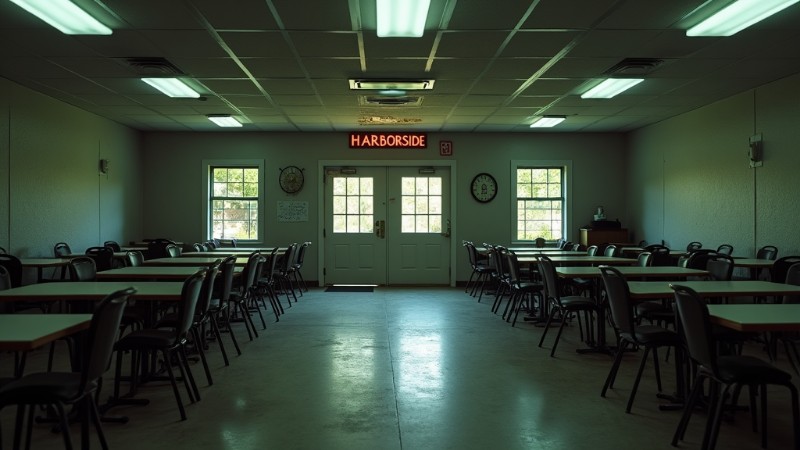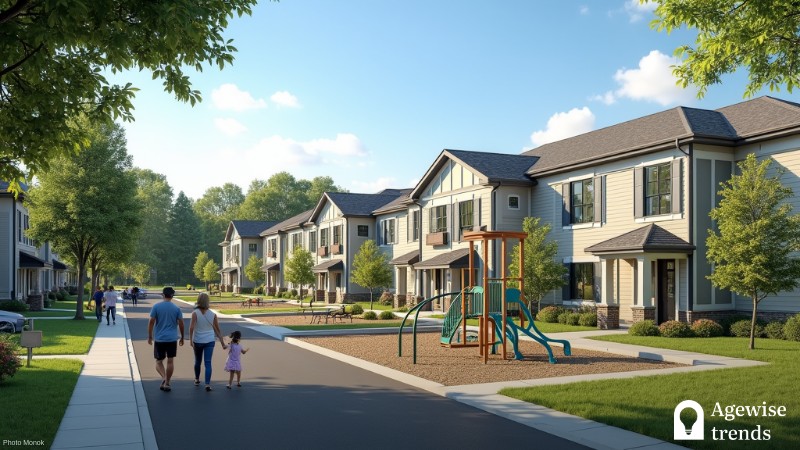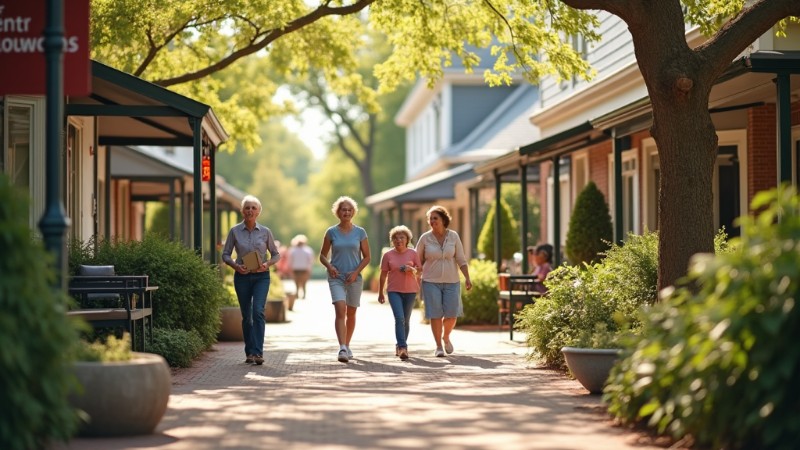The Harborside retirement community in Port Washington, New York, faces an uncertain future as it grapples with severe financial difficulties, putting the lives of its elderly residents and dedicated staff in jeopardy. Serving 181 residents with an average age of 90, the facility is now on its third Chapter 11 bankruptcy filing, an unsettling trend that has persisted over recent decades.
The crisis deepened after Sodexo Inc., Harborside’s dining services provider, requested permission to end its contract due to over $1 million in unpaid bills. This latest blow has prompted a rally among residents and supporters, who are calling on New York State officials, including Governor Kathy Hochul, to intervene and help stabilize the community before it faces potential closure.
Key Takeaways
Harborside retirement community in Port Washington, New York faces financial crisis, putting the lives of its 181 residents at risk.
- Residents are rallying to save their homes after Sodexo Inc. requested permission to end its contract due to over $1 million in unpaid bills.
- The New York State Department of Health rejected a $104 million bid from Life Care Services (LCS) to acquire Harborside, citing insufficient documentation as a primary concern.
- Residents and advocates are calling for state oversight reforms to support struggling senior communities like Harborside, which require flexible regulatory approaches to navigate financial adversity without compromising resident welfare.
Rallying to save our homes
The community’s financial situation has mobilized approximately 200 residents, family members, and local officials, who gathered at Harborside in a rally aimed at preserving the home that so many rely on. Among the participants was Bob Curtis, a resident who fears losing not only his cherished residence but also his hard-earned savings if Harborside were forced to shut down.
Curtis, who invested an $800,000 entrance fee, voiced concerns that the financial collapse could separate him from his wife, Sandy, who is currently receiving care in Harborside’s dementia unit. His story mirrors the anxieties of many residents who worry about both financial loss and the disruption of their lives and community ties.
The rally participants directed an urgent appeal to Governor Hochul, urging her to take action that would prevent the potential displacement of residents, many of whom consider Harborside their permanent home.
For these elderly residents, relocation is not a simple matter; many have complex health and social needs, making Harborside an essential support network. The rally highlighted that for many residents, losing Harborside would mean not only a loss of housing but a disintegration of the relationships and routines that give them a sense of belonging and stability.
Financial crisis and loss of services
The financial instability at Harborside has now reached critical levels, as demonstrated by Sodexo’s attempt to exit its contract with the community. Sodexo, which has provided dining services to Harborside, cites more than $1 million in unpaid invoices and chronic payment delays, leading to contractual interest charges that further exacerbate the community’s financial strain.
Should Sodexo’s request be approved, Harborside residents would lose access to a vital service, with additional repercussions for the 66 Sodexo employees working on-site, who could face unemployment if Harborside fails to remain operational.
Amid these challenges, Harborside had been negotiating a buyout with Life Care Services (LCS), a company that manages similar senior living facilities across the country. LCS submitted a $104 million bid to acquire Harborside, a deal that many residents and supporters saw as a lifeline.
However, New York State’s Department of Health (NYDOH) rejected LCS’s application, citing insufficient documentation as a primary concern. This decision has fueled frustrations within the community, with some residents accusing the NYDOH of providing inaccurate or incomplete information to Governor Hochul, thus complicating efforts to save the facility.
With LCS having since withdrawn its bid, Harborside is left in a precarious position, lacking a clear path to financial recovery. The NYDOH’s decision, viewed by some as an obstacle to progress, has sparked debate about the role of regulatory oversight in supporting or hindering struggling senior communities.
Many residents and their families argue that state agencies should be more flexible in helping vulnerable populations avoid displacement, particularly when viable alternatives, like the LCS acquisition, are on the table.
Risks to resident welfare and financial security
The uncertainty surrounding Harborside’s future has generated a wave of anxiety among its residents, many of whom have paid substantial entrance fees ranging from $527,250 to $2.2 million, expecting secure and stable residency. Now, those upfront investments are at risk, as the possibility of Harborside’s closure threatens to render these payments unrecoverable.
Curtis, whose $800,000 entrance fee represents a significant portion of his life savings, describes the situation as “elder abuse.” He, like many other residents, feels betrayed by a system that promised security and longevity but now appears precariously unstable.
This financial strain compounds the emotional toll felt by residents, who face the prospect of being uprooted from the community they consider home. For elderly residents, the risks of displacement are profound, impacting both their emotional well-being and physical health.
The looming threat of separation from familiar surroundings, caregivers, and community networks is especially challenging for those in Harborside’s dementia care unit or who require specialized services that may be unavailable elsewhere.
The November 6 hearing at the Brooklyn federal courthouse is a crucial moment for the community, as a judge will decide whether Sodexo can terminate its contract with Harborside.
The outcome of this decision will affect not only the dining services residents rely on but also the future of Harborside’s workforce, as LCS had intended to retain existing staff had it proceeded with the acquisition. Without such continuity, the employees who support daily operations at Harborside may face a job loss, adding another layer of disruption to the community’s stability.
State oversight and resident advocacy
Despite the NYDOH’s decision to reject the LCS proposal, the department has expressed a commitment to working with Harborside’s current management to ensure residents’ needs are met amid the financial turmoil.
Additionally, Governor Hochul has reassured residents that they will not face eviction while she remains in office, a pledge that has provided temporary relief. However, some residents and advocates argue that this assurance, while well-intentioned, does not address the underlying financial issues that have brought Harborside to the brink of collapse. They believe a more comprehensive intervention, possibly involving regulatory and financial reforms, is necessary to stabilize the community in the long term.
As Harborside’s future hangs in the balance, discussions around the role of state oversight in retirement communities have gained traction. Residents have voiced concerns that regulatory policies, while designed to ensure safety and compliance, may inadvertently restrict access to vital capital and resources needed for operational stability.
They argue that continuing care retirement communities (CCRCs) like Harborside require a flexible regulatory approach that considers the unique financial and social needs of senior residents. This includes mechanisms for state support in times of crisis and policies that allow for quick intervention in financial emergencies to prevent displacement.
For Harborside’s residents, the prospect of a secure future is contingent on finding a multifaceted solution. While the LCS acquisition presented one possible path to stability, it also highlighted the need for reliable financial resources, effective management, and cooperative state regulations that allow struggling CCRCs to navigate financial adversity without compromising resident welfare.
As the hearing date draws nearer, many residents hope for a favourable decision that will allow Harborside to maintain essential services and avoid the tragic consequences of closure.
Looking toward the road ahead
The Harborside situation underscores the complexities inherent in managing CCRCs and the importance of a well-balanced approach to state oversight and financial regulation. Moving forward, policymakers and regulators may need to re-evaluate how they support such communities, particularly those that serve vulnerable elderly populations with limited options for relocation.
As the November 6 hearing looms, the residents of Harborside and their families can only hope that a resolution will be reached that not only preserves their homes but also secures the financial resources needed to sustain Harborside for years to come.
The collective anxieties of Harborside’s residents underscore the importance of establishing a stable, supportive environment for seniors, ensuring that CCRCs like Harborside remain safe havens where elderly individuals can live with dignity and peace of mind.















